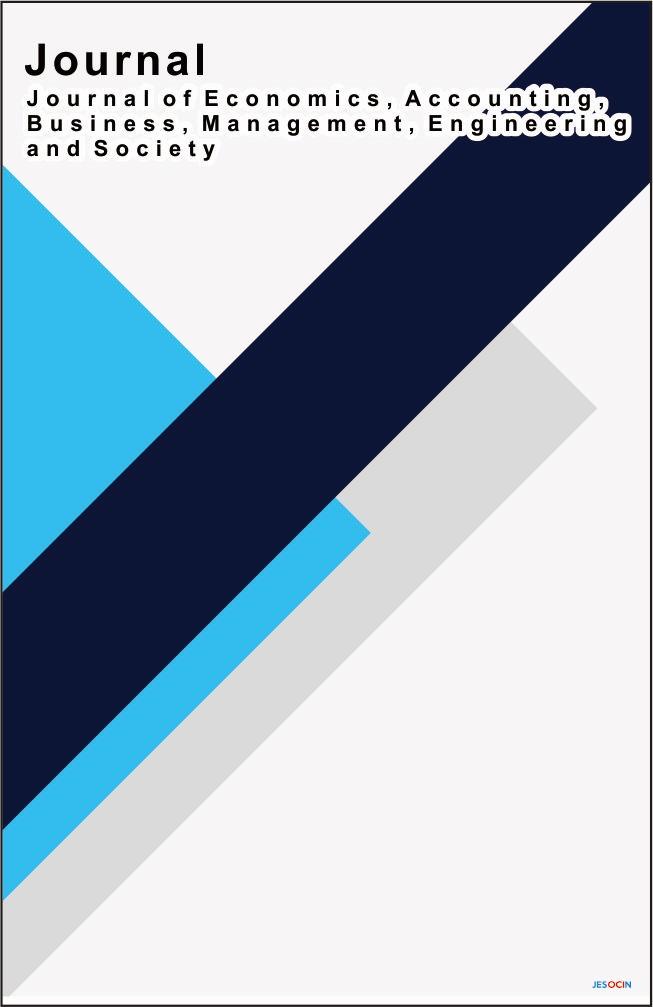ASSESSING THE ROLE OF MANAGEMENT ACCOUNTING IN STRATEGIC DECISION-MAKING AND ORGANIZATIONAL PERFORMANCE
Keywords:
Interest Rates, Consumer Loan Demand, Bank Profitability, MacroeconomicsAbstract
Background:
The central role of interest rates in macroeconomics cannot be overstated. Interest rates not only influence the economic landscape but also affect consumer spending, investment, and borrowing. Among these, consumer loan demand and bank profitability are two areas significantly impacted by fluctuations in interest rates. Banks adjust their lending practices, and consumers' borrowing behavior shifts according to the prevailing rates, which ultimately influences economic stability. Understanding these dynamics is crucial for both financial institutions and policymakers to craft effective strategies.
Aims:
This study aims to analyze the effect of interest rate changes on consumer loan demand and the profitability of commercial banks. It seeks to identify patterns, establish causal relationships, and propose actionable insights for financial institutions.
Research Method:
A mixed-method approach is adopted, employing both qualitative and quantitative data. Time-series analysis is conducted on historical data spanning the last two decades, incorporating macroeconomic variables and interest rate trends. In addition, surveys of consumer attitudes toward loans at different interest rate levels are analyzed to gauge demand sensitivity.
Results and Conclusion:
Preliminary findings suggest a significant inverse relationship between interest rates and consumer loan demand. Banks experience increased profitability in periods of higher interest rates, although at the cost of potential market contraction. Lower rates generally boost consumer loan demand, but the effects on profitability are more nuanced, depending on the type of loan products offered.
Contribution:
This research provides a comprehensive analysis of how shifts in interest rates influence consumer behavior and bank profitability. It contributes to a better understanding of how banks should tailor their lending strategies in response to rate changes and provides insights for policymakers on the broader economic implications of interest rate adjustments.
Downloads
References
Abdennadher, S., Alsharif, M. H., & Alshahrani, S. (2021). The effects of blockchain technology on the accounting and assurance profession in the UAE: An exploratory study. *Journal of Financial Reporting and Accounting*, 19(2), 263-279. https://doi.org/10.1108/jfra-05-2020-0151
Alotaibi, M. (2022). A conceptual model of continuous government auditing using blockchain-based smart contracts. *International Journal of Business and Management*, 17(11), 1-12. https://doi.org/10.5539/ijbm.v17n11p1
Bellucci, M., & Cangemi, M. (2022). Blockchain in accounting practice and research: Systematic literature review. *Meditari Accountancy Research*, 30(3), 1-24. https://doi.org/10.1108/medar-10-2021-1477
Carvalho, M. M., & Ferreira, J. (2022). Ledger to ledger: Off- and on-chain auditing of stablecoin. *International Journal of Digital Accounting Research*, 22(1), 1-20. https://doi.org/10.4192/1577-8517-v22_5
Dong, Y. (2023). Enterprise audits and blockchain technology. *SAGE Open*, 13(1), 1-12. https://doi.org/10.1177/21582440231218839
Dyball, M., & Seethamraju, P. (2021). Client use of blockchain technology: Exploring its (potential) impact on financial statement audits of Australian accounting firms. *Accounting Auditing & Accountability Journal*, 34(4), 1-25. https://doi.org/10.1108/aaaj-07-2020-4681
Dyball, M., & Seethamraju, P. (2021). The impact of client use of blockchain technology on audit risk and audit approach—An exploratory study. *International Journal of Auditing*, 25(2), 1-15. https://doi.org/10.1111/ijau.12238
Ebirim, C. (2024). Evolving trends in corporate auditing: A systematic review of practices and regulations in the United States. *World Journal of Advanced Research and Reviews*, 21(1), 1-15. https://doi.org/10.30574/wjarr.2024.21.1.0312
Huang, Y. (2023). Review on research of blockchain's impact on bookkeeping, fraud detection and trust of auditing process. *Advances in Economics Management and Political Sciences*, 22(1), 1-15. https://doi.org/10.54254/2754-1169/22/20230287
Kazan, A. (2023). Assessing the impact of blockchain technology on internal controls within the COSO framework. *Journal of Corporate Governance Insurance and Risk Management*, 10(1), 1-15. https://doi.org/10.56578/jcgirm100110
Lombardi, M., & Pizzolato, N. (2021). The disruption of blockchain in auditing – A systematic literature review and an agenda for future research. *Accounting Auditing & Accountability Journal*, 34(5), 1-25. https://doi.org/10.1108/aaaj-10-2020-4992
Noviani, M., & Muda, I. (2022). The evolution of accounting software: Review of blockchain technology in audit. *Proceedings of the EAI International Conference on Computer Science and Engineering*, 1-8. https://doi.org/10.4108/eai.25-11-2021.2318839
Oladejo, M. A., & Jack, A. (2020). Fraud prevention and detection in a blockchain technology environment: Challenges posed to forensic accountants. *International Journal of Economics and Accounting*, 11(2), 1-15. https://doi.org/10.1504/ijea.2020.110162
Parmoodeh, M., & Alshahrani, S. (2022). An exploratory study of the perceptions of auditors on the impact of blockchain technology in the United Arab Emirates. *International Journal of Auditing*, 26(1), 1-15. https://doi.org/10.1111/ijau.12299
Rabie, M. (2023). The impact of cloud-based enterprise resource planning system on blockchain adoption, with the presence of cloud auditing as an intermediary variable in Jordanian commercial banks. *Migration Letters*, 20(6), 1-15. https://doi.org/10.59670/ml.v20i6.3496
Rahmawati, F., & Syahputra, M. (2023). Demystifying of triple-entry accounting (TEA): Integrating the block. In *Proceedings of the International Conference on Business and Management* (pp. 1-10). https://doi.org/10.2991/978-94-6463-158-6_3
Secinaro, S., & D'Onofrio, A. (2021). Blockchain in the accounting, auditing and accountability fields: A bibliometric and coding analysis. *Accounting Auditing & Accountability Journal*, 34(6), 1-25. https://doi.org/10.1108/aaaj-10-2020-4987
Sheela, K. (2023). Navigating the future: Blockchain’s impact on accounting and auditing practices. *Sustainability*, 15(24), 1-15. https://doi.org/10.3390/su152416887
Vukovljak, M., & Peter, M. (2023). The impact of new technologies on the connotation of audit profession. *MAP Social Sciences*, 3(1), 1-15. https://doi.org/10.53880/2744-2454.2023.3.1.11
Yerram, R. (2021). The role of blockchain technology in enhancing financial security amidst digital transformation. *Asian Business Review*, 11(3), 1-15. https://doi.org/10.18034/abr.v11i3.694

Downloads
Published
Issue
Section
License
Copyright (c) 2024 Ucu Supriatna, Wawan Ichwanudin, Ijang Faisal (Author)

This work is licensed under a Creative Commons Attribution-ShareAlike 4.0 International License.












